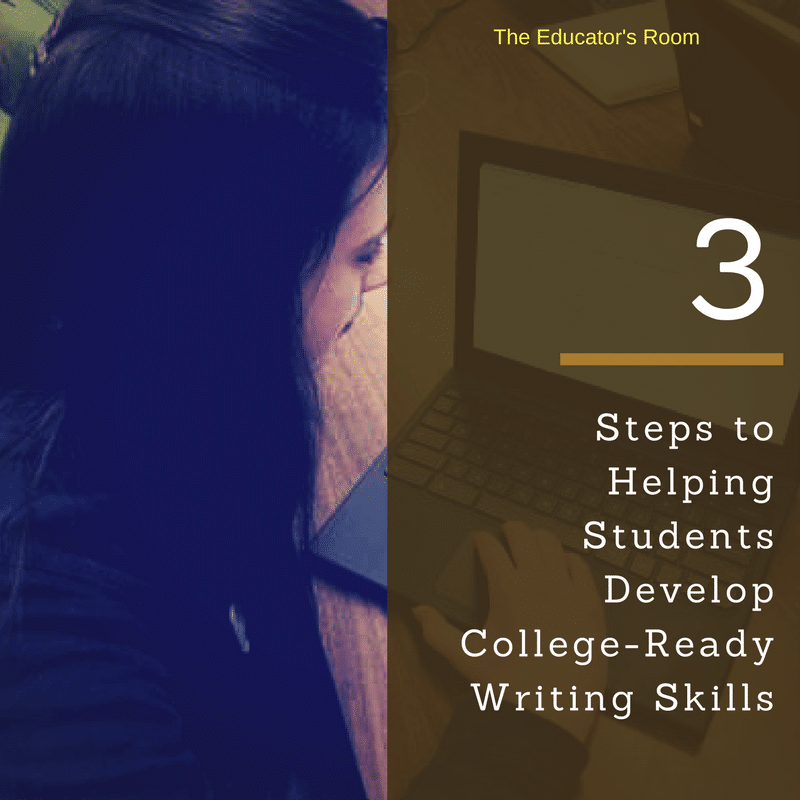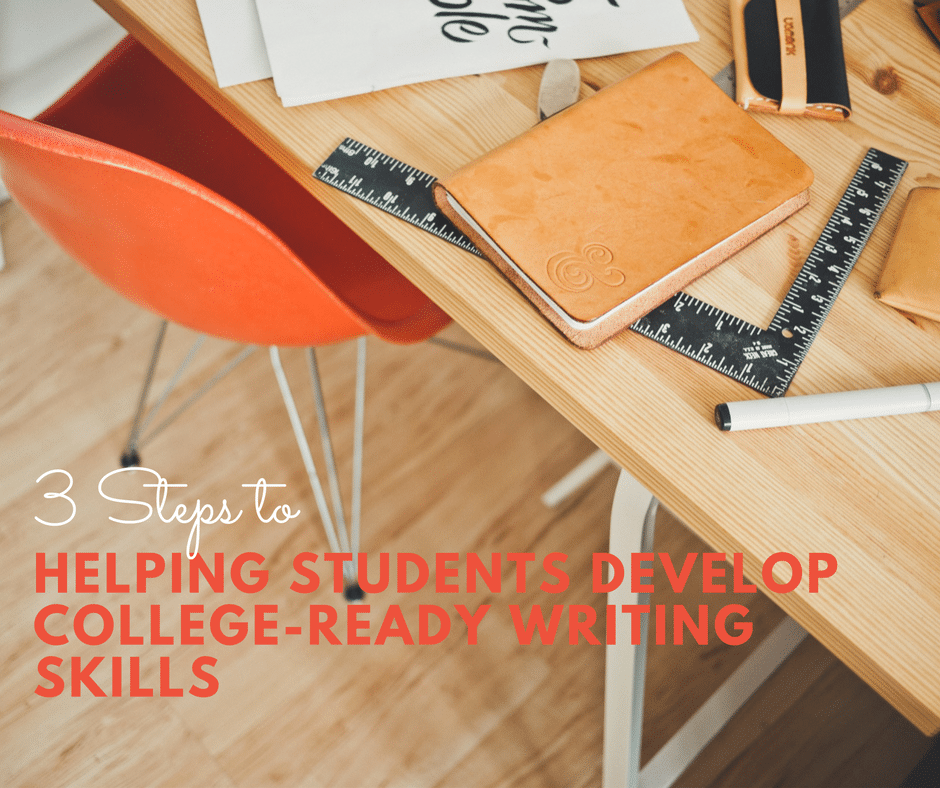Teachers are forever reminding their students that what’s going on in their classrooms will be ‘important to know in high school and college’ – but how many students actually believe them? I remember one student who replied to me when I said that: “Yeah, that’s what they say every year. And it’s never really true – we keep repeating stuff we already learned.”
So I decided those were words I never want to utter – or hear – again.
Helping students develop college-ready writing skills starts early. Teachers don’t have to name it that, but beginning with the end in mind when constructing writing instruction will help develop the “art of the novice” into the “art of the master.”
[bctt tweet=”beginning with the end in mind” username=”EducatorsRoom”]
I strongly believe in the habits of mind. Far too often teachers demand students perform, produce, and create at levels that frequently are pushing students outside of their comfort zones without reciprocating themselves. Teaching students to think intelligently through points of confusion is an important concept, yet I believe that goes in tandem with teachers doing the same. For example, when was the last time you as a teacher learned something new? Did you learn it in the comfortable solitude of a quiet room, or were you on display in front of a crowd? Was anyone watching you struggle?
Today was the last time I learned something new. I was attending NCTE17 and pushed myself to participate in a roundtable discussion about recording audio books for reluctant readers. I listened, analyzed, questioned, and after 15 minutes walked away with skills to create new learning tools.
Helping students develop college-ready writing skills requires the development of strong habits of mind. According to the Framework for Success in Postsecondary Writing, developed by the Council of Writing Program Administrators, the National Council of Teachers of English, and the National Writing Project: “eight habits of mind and experiences that are critical for college success: curiosity, openness, engagement, creativity, persistence, responsibility, flexibility, and metacognition.”
So let’s start with ourselves. When did you last assess your own ‘habits of mind?” Because in order for our students to develop college-ready writing skills, we need to be open, engaged, flexible and curious about HOW to make this happen in our classrooms.
In California, about 14 CSU campuses are moving away from placing freshmen students into English classes, instead opting to let kids go through modules and decide for themselves where they start. Campuses are finding students have better completion even when they fail because they have no one else to blame. They were and are responsible for their success, and rely on their engagement, creativity, and persistence to meet the rigorous standards of the course.
[bctt tweet=”When did you last assess your own ‘habits of mind?”” username=”EducatorsRoom”]
So what does that look like in OUR classrooms? How do we prepare our students for self-placement?
1. Offer more student efficacy and student agency over their learning.
When teachers are in control, students lose the opportunity to push themselves for internal motivators. When too much emphasis is put on the grade or a perfect product, the learning takes the backseat. Far too often we see our high-achieving kids moving towards ‘doing what it takes for the A’ rather than ‘doing what it takes to master the concept.’ Starting in the early grades, teachers need to create an assessment to incorporate more reflection and portfolio creation, thus preparing students with the grit, persistence and metacognitive skills required in college-level writing.
2. Balance the teaching of literature and writing skills.
Many freshmen college English courses don’t teach a literature-heavy syllabus; professors may use literature and mentor texts mainly to analyze writing. Reliance on literature in middle and high school English courses may feel comfortable and familiar to teachers, but we must stop and reflect WHY we are teaching each novel, being mindful of the quality of the writing along with the conceptual focus we are offering our students. Just because we have ‘fun’ projects that go along with a certain text isn’t enough to prepare students for college-ready writing skills; as much as I wish my students would all turn into English majors who could help save the world from the problems before us, I know that a balance of literature and writing skills will best prepare them for all majors they may choose.
3. Teach students the threshold concepts for writing
Students should be taught that the qualities of good writing are determined by context, and that writing development happens over time. Writing is not linear. In my classroom, students are encouraged to go back to writing pieces they started in elementary school and rewrite them as an ‘8th-grade writer’. The surprise in their eyes when I give them permission to work on something they already started is priceless, and the engagement is high. According to Adler-Kassner, 2012, writing performance “involves cultural analysis, participation and cognitive ability.” We need to teach students that writers grow through writing, reflecting on writing, giving and receiving feedback, and revision, revision, revision. This is NOT what most students want to hear; most teachers don’t want to hear it either, frankly.
To help students develop college-ready writing skills we must move away from the ‘one and done’ idea of writing towards a more multimodal, longitudinal approach. Fostering the skill of metacognition is integral to developing as a writer – students need to know own their writing as a work in progress. Teachers should allow students to write and rewrite, only evaluating a piece when a student feels it is ready to publish. We know that writers apply writing knowledge through analysis and use of strategies involved with prior knowledge. Creating instruction with this in mind is key to fostering college ready writers – when teachers focus on skills and strategies integral to the types of writing students are engaged in, this transfer of knowledge helps produce high-quality work.








Jennifer, your comment about teachers learning new things resonated with me. After twenty-two years of frustration with my students’ writing, I am in the process of learning the craft of teaching writing in the social studies. We
Hi Laura,
Thanks so much for your comment. I’m happy to hear you’re pushing yourself forward as well – I think that when we show our students we are lifelong learners, we are modeling exactly what we’d like our students to embody!